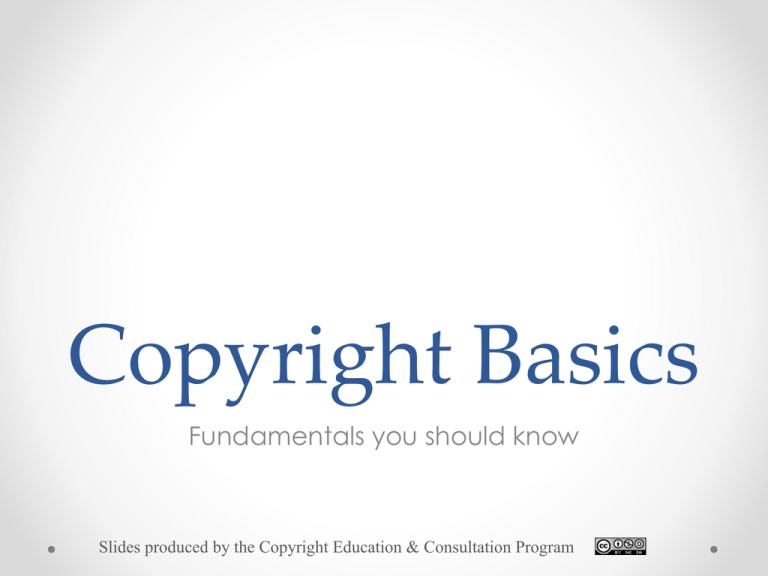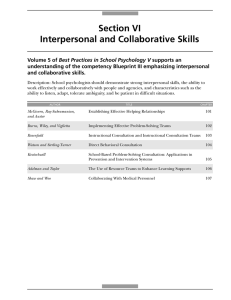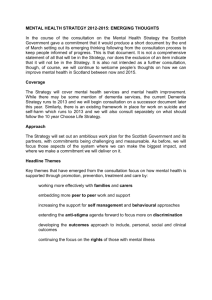Copyright Basics Fundamentals you should know
advertisement

Copyright Basics Fundamentals you should know Slides produced by the Copyright Education & Consultation Program Guiding Questions • What is copyright? o What is protected under the law? What is not? • What are copyright terms? o How long do they last? • What are some of the exceptions and limitations of copyright? • How can I copyright my own work? Slides produced by the Copyright Education & Consultation Program What is copyright? Congress has the power, “…to promote the Progress of Science and useful Arts, by securing for a limited Time to Authors and Inventors the exclusive Right to their respective Writings and Discoveries.” - U.S Constitution, Article I, Section 8, Clause 8 Slides produced by the Copyright Education & Consultation Program What is copyright? • U.S. Copyright law is not static • Current copyright law grants the creator (author, artist, composer, etc.) the exclusive right to: o Reproduce o Prepare derivative works o Distribute copies by sale (or other transfer of ownership), rental, lease, or lending o Perform a work publicly o Display a work publicly • This right lasts for a set amount of time Slides produced by the Copyright Education & Consultation Program What is protected? • Copyright law protects works that are original and fixed o Original - the work must be unique and not a copy o Fixed - the work must be written or recorded in a tangible manner (digital works are considered tangible) Slides produced by the Copyright Education & Consultation Program What is not protected? • Copyright does not cover many things including: o o o o o Ideas Titles Processes Works prepared by the federal government Works that are in the public domain Slides produced by the Copyright Education & Consultation Program What are Copyright Terms? • Terms are the duration of copyright • Terms vary depending on a number of factors: o o o o Whether or not the work was published Date of publication If the author was an individual or a corporation And more ! Slides produced by the Copyright Education & Consultation Program What are the Exceptions and Limitations? • Copyright law has several exceptions and limitations built into it • Going to focus on the two you will likely encounter most: o Fair use o Classroom exceptions • To see the others look through copyright law beginning at Section 107 o http://www.copyright.gov/title17/92chap1.html# 107 Slides produced by the Copyright Education & Consultation Program What is fair use? • Fair use is a broad exception that allows people to use a work without permission in certain circumstances • Four factors to consider: o o o o What is the character or purpose of the use? What is the nature of the material being used? How much of the work will be used? What effect will this use have on the market for the original material? Slides produced by the Copyright Education & Consultation Program How Can I Copyright My Work? • All fixed work is automatically copyrighted • Visit http://www.copyright.gov/eco/ if you do want to register your work online with the U.S. Copyright office Slides produced by the Copyright Education & Consultation Program Questions? Slides produced by the Copyright Education & Consultation Program Resources • Search for the status of copyrighted material from after 1978: o http://www.copyright.gov/records/ • Search for the status of some copyrighted material from before 1978: o http://collections.stanford.edu/copyrightrenewals/ • Copyright Education & Consultation page on copyright basics: o http://blogs.cites.illinois.edu/library-copyright/copyrightbasics/ • Copyright Law o http://www.copyright.gov/title17/ Slides produced by the Copyright Education & Consultation Program More Info … The Copyright Education & Consultation Program is funded by a Library and Technical Services Grant Administered by the Illinois State Library Please visit our website at http://go.illinois.edu/copyright Slides produced by the Copyright Education & Consultation Program





